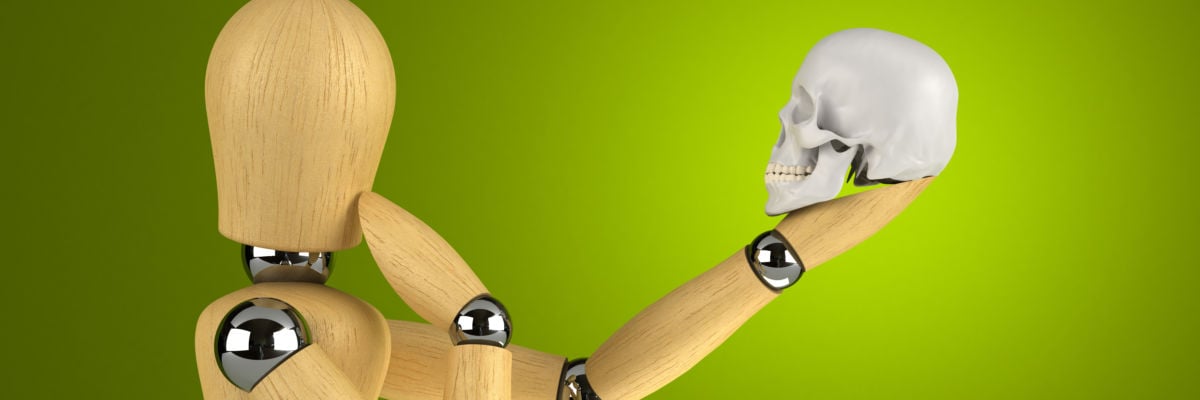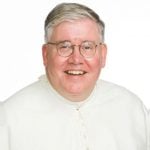
As he passed by, he saw a man blind from his birth. And his disciples asked him, “Rabbi, who sinned, this man or his parents, that he was born blind?” Jesus answered, “It was not that this man sinned, or his parents, but that the works of God might be made manifest in him. We must work the works of him who sent me, while it is day; night comes, when no one can work. As long as I am in the world, I am the light of the world.” As he said this, he spat on the ground and made clay of the spittle and anointed the man’s eyes with the clay, saying to him, “Go, wash in the pool of Siloam” (which means Sent). So he went and washed and came back seeing. (John 9:1-7).
Wow! If ever there were a reading that is right on target for our current days of bodily fears and dangers, this is it. Two marvelous truths are both implied and concretely shown in this delightful gospel lesson. (Note: Read the whole passage, not just the portion given above: how charming are the Lord and the Blind Man! They are like true, humble brothers, each made for the other for the glory of God.) There are of course many other truths found in this richly woven tapestry of spiritual power; we will speak of two of them here.
1. We are our bodies.
When you see or touch or hear my body, you see, touch, or hear me. Here, in contrast, is a surprising look into the religious beliefs of some Jews of our Lord’s time (and even among some sects of religious Jews now). Notice that the Savior’s disciples seem to think someone might be able to sin before he is born. They believed that the soul existed before it entered the body. This was a common error: it was hard to eliminate among the first Christians and even was considered by some of the early Church Fathers and writers.
Why do we reject this idea, common as it has been? Because, again, we are our bodies, living by the power of our spiritual souls. The very word soul means that it is a principle of life in a body, not a simple spirit. Our soul comes to be, is created by God, at its union with the body. A body is simply dead without a soul, and a soul is “out of place” without a body. My mother’s body lying in its grave is not my mother. My mother’s soul in the life to come did not give birth to me. She is both.
That is why death is a loss, and why we fear and mourn it. And that is why we are so afraid of epidemics and pestilence. We do not want ourselves or our loved ones to experience the separation of soul and body that is death. Angels do not fear disease; they do not need to take any precautions; they do not observe “social distancing.” Neither do the Risen Lord and His Holy Mother, likewise glorious, because they are immortal; they cannot die. Even the disembodied souls of the saints in heaven and the souls in purgatory, who will not die a second time, still are not “completely” immortal until their bodies are no longer dead, but alive!
Disease points to death, and death is the end of our complete, personal existence. This is a fearsome thought. We know that only a power infinitely greater than ours can heal all bodily disease and overcome death in the resurrection to endless life in body and soul.
2. The Body of God is God. Believe in, touch, receive, love, see, hear, desire, embrace the body of Christ, and you believe, touch, receive, love, see, hear, desire, and embrace God himself. This is because he was incarnate in a body, and he did not abandon it ever. His is always the body of God; he is not dead. He is ever your Jesus. This is why the Lord used his body to work miraculous cures.
St. Thomas Aquinas comments on the passage above and, speaking of the Lord’s miracles, says, “Frequently he uses his body in his miracles in order to demonstrate that his body, insofar as it is the instrument (literally “organ”) of his Godhead, has received a certain saving power” (Commentary on the Gospel of John).
We must stir up our faith and desire for the body of our God and the saving power it possesses to heal and even to raise up from the dead. It is a truth of the creed that we infallibly profess and declare that he will raise us up from bodily death on the last day by the power of his own incarnation, of his own body.
Let us confront sickness and death with this confidence, and all will be well! The same body that is the battleground of sin, passions, and sickness will be the place of victory, health and healing, and undying life. All glory to the glorious body of the Lord, born of the Virgin Mary, and dwelling in our tabernacles! All glory to the resurrection of his holy ones, unto which happy lot may he draw us by the power of that same body!
He is the one who said, “And I, when I am lifted up from the earth [in his body on the cross], will draw all men to myself,” and elsewhere, “He who eats my flesh and drinks my blood has eternal life, and I will raise him up at the last day.” Let us feed on him by faith and love, and this will calm our fear of bodily death!



